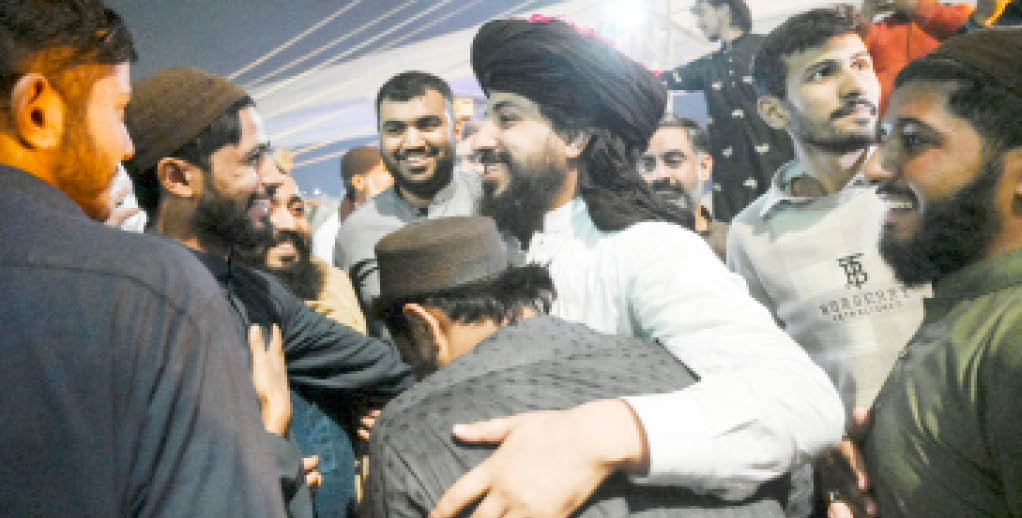Hamtramck: The US city run by Muslims
A walk down the main street in Hamtramck, Michigan, United States, feels like a tour around the world. A Polish sausage store and an Eastern European bakery sit alongside a Yemeni department store and a Bengali clothing shop. Church bells ring out along with the Islamic call to prayer. “The world in two square miles” – […]

Saad Rizvi (C), head of the Islamist religious party Tehreek-e-Labbiak Pakistan (TLP), celebrates with supporters following his release from detention, in Lahore yesterday
A walk down the main street in Hamtramck, Michigan, United States, feels like a tour around the world.
A Polish sausage store and an Eastern European bakery sit alongside a Yemeni department store and a Bengali clothing shop. Church bells ring out along with the Islamic call to prayer.
“The world in two square miles” – Hamtramck lives up to its slogan, with around 30 languages spoken within its 5 sq km area.
This month, the Midwestern city of 28,000 has reached a milestone. Hamtramck has elected an all-Muslim City Council and a Muslim mayor, becoming the first in the US to have a Muslim-American government.
Once faced with discrimination, Muslim residents have become integral to this multicultural city, and now make up more than half its population.
And despite economic challenges and intense cultural debates, residents in Hamtramck from different religious and cultural backgrounds coexist in harmony, making the city a meaningful case study for America’s future of rising diversity.
But will Hamtramck be an exception or a rule?
The arc of Hamtramck’s history from beginnings as a town of German settlers to the modern day – it was America’s first majority-Muslim city – is etched in its streets.
Storefronts display signs in Arabic and Bengali, embroidered Bangladeshi garments and Jambiyas, a type of short curved blade from Yemen, are seen in store windows. Muslim residents queue up to buy paczki, a kind of custard-filled Polish doughnut.
“It’s not unusual to see some with miniskirts and tattoos and some in burqas walking on the same street. This is all about us,” said Zlatan Sadikovic, a Bosnian immigrant who owns a café in downtown Hamtramck.
Over the last 30 years, Hamtramck transformed to become a landing pad for Arab and Asian immigrants, notably those from Yemen and Bangladesh. A significant portion of the city’s residents today – 42% – are foreign born. More than half are believed to be practising Muslims.
The newly elected government’s makeup reflects the changing demographics in Hamtramck. The city council will include two Bengali Americans, three Yemeni Americans and a Polish-American convert to Islam.
Winning 68% of the vote, Amer Ghalib will be the first Yemeni-American mayor in the US. “I feel honoured and proud, but I know it’s a big responsibility,” Mr Ghalib, 41, said.
Rather than being a “melting pot” or “salad bowl”, Hamtramck is more like a “seven-layer cake” where different groups retain their distinct cultures while closely co-existing with each other, said city councilmember-elect Amanda Jaczkowski. “People are still proud of their culture specifically, whereas if it’s assimilation, we would lose the uniqueness.”
“When you live this close to each other, you are forced to overcome those differences,” Ms Jaczkowski, 29, said.
But Hamtramck “is not Disneyland”, said Karen Majewski, the outgoing mayor who will have served in office for 15 years before stepping down. “It’s just a small place. And we do have conflicts.”
The US Census Bureau does not collect information about religion, but the Pew Research Centre think tank estimates that there were about 3.85 million Muslims living in the US in 2020, making up about 1.1% of the total population. By 2040, Muslims are projected to become the second largest religious group in the US, after Christians.
Despite their growing presence, Muslims in America have often been subjected to prejudice.
Hamtramck is a living example of how personal knowledge curtails Islamophobia.
When Shahab Ahmed ran for city councilmember shortly after the 9/11 attack, he faced an uphill battle.
(BBC)
